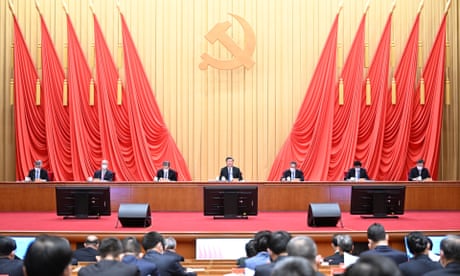A moment of pity for the uber-wealthy. According to the Hurun Global Rich List, China has more billionaires than any other country. But it is also the place in which the monied must watch their back.
On Friday, Fu Xiaodong, a former senior official at China Development Bank, was sentenced to 10 years in prison for accepting 4. 3m yuan (£503,466) in bribes during his tenure between 2007 and 2020. Days earlier, the former director of the supreme people’s court enforcement bureau was sentenced to 12 years in prison for accepting bribes worth 22.
74m yuan (£2. 65m). Meng Xiao was found guilty of abusing his position for financial gain for more than a decade.
That an official whose influence could be bought has been flushed out of the system is ostensibly a win for due process. But last week’s conviction came on the back of a string of investigations launched by China’s anti-corruption watchdog, as Xi renews his drive to clean out and control officials in the Chinese Communist party (CCP) – and beyond. “Intense scrutiny” has become the “new normal” in China, says Yuen Yuen Ang, a professor at Johns Hopkins University and author of a book on corruption in Chinese politics.
“The campaign extends beyond fighting graft and into enforcing ideological conformity with the party line. ” Since Xi came to power in 2012, one of his flagship policies has been his anti-corruption drive. Xi sees corruption as an existential threat to the CCP and has made no secret of wanting to root out “tigers” (senior corrupt officials) and “flies” (low-level cadres).
In Xi’s first year in power, more than 180,000 officials were disciplined, compared with about 160,000 the year before. In the next decade, 3. 7 million cadres were punished by the party’s anti-graft watchdog, including about 1% of national and provincial leaders.
As well as helping to rid Xi of political rivals, the campaign has been popular with the Chinese public, with many people appalled by the accruement of riches that increasingly accompanied political office. The riches were often astonishing: a new study published by the Stone Center on Socio-economic Inequality, a research institute, found that in the decade after Xi took office, 91% of officials convicted of corruption were in the richest 1% of China’s urban population. Were it not for their ill-gotten gains, only 6% would have been in that elite segment.
The authors Li Yang, Branko Milanovic and Yaoqi Lin note that “corruption is thus a very powerful mechanism of upward income mobility”. Powerful politicians often find friends in China’s booming world of private entrepreneurs. Those businesspeople “prosper when their patrons rise and perish together when their patrons fall,” says Ang, the professor at Johns Hopkins.
This year more than 50 senior figures from major banks and state-owned enterprises have either been investigated or disciplined by the Central Commission for Discipline Inspection (CCDI), the anti-graft watchdog. The party sees financial risks as a matter of national security. In February, the CCDI published an essay about the “battle” against corruption which criticised “financial elitism” in particular.
Several big names have been swept up in the purge. In March, the CCDI referred Zhao Weiguo, a semiconductor tycoon, to prosecutors after concluding that Zhao engaged in corrupt practices when he was the chairman of Tsinghua Unigroup. The firm was once one of China’s leading makers of computer chips, before it was declared bankrupt in 2021.
In recent weeks the CCDI also announced investigations into Liu Liange, the former Bank of China chairman, and Li Xiaopeng, the former chairman of the state-owned financial conglomerate China Everbright Group. Bao Fan , a billionaire tech banker, was taken away by the authorities in February to assist with an investigation and hasn’t been seen in public since. Xi is personally mistrustful of financiers and their loyalty to the party.
After his crackdown on corruption began in 2013, China’s elites started whisking their money out of the country. In 2014, China had nearly $4tn in foreign reserves; within two years that figure had dropped by nearly one-quarter, and it has yet to recover. Plus, the party knows that corruption tends to follow money.
“Top leaders, including President Xi, have repeatedly emphasised preventing corruption in areas with high capital intensity,” says Zhu Jiangnan of the University of Hong Kong. James Palmer, the deputy editor of Foreign Policy magazine and a longtime China-watcher, has noted that in recent months Chinese officials have started to talk about the need for a “sweet potato economy” – a term first used in 2021 by Xi to describe Chinese firms that stay rooted in China and under the CCP’s control, even as they expand to absorb the “sunlight” and “nutrients” of the global economy. It is not just financiers who have been swept up in the latest purge.
On 9 April, the CCDI said it would probe 30 state-owned enterprises and the General Administration of Sport; several football officials have already been placed under investigation. The move to investigating bigger fish is part of a trend. Zeren Li of Yale University notes that in the early years of the anti-corruption campaign, most of the targets were local officials.
But in recent years the focus has shifted to central ministries and specialised inspections, such as the latest one on finance. Some might question why, after more than a decade of purges, the party under Xi still seems to be rooting out problems. Ling Li, a lecturer at the University of Vienna, says that the very structure of the party breeds graft: a lack of transparency benefits both autocratic leaders and unscrupulous cadres.
Plus, Ling notes, watchdogs such as the CCDI are centralised, while “corruption occurs in a very decentralised fashion. That means you always have more corruption than the anti-corruption agency has the capacity to investigate. ”.
From: theguardian
URL: https://www.theguardian.com/world/2023/apr/19/unsafe-at-the-top-chinas-anti-graft-drive-targets-billionaires-and-bankers



